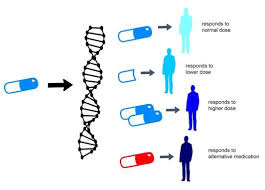
November 3, 2021
Are my prescription medications helping me or hurting me?
Have you ever wondered if the medications that you are taking or someone that you love is taking are helping you, hurting you or even working at all? Have you ever wondered if you are having an unexpected reaction or side effect to your meds?
What is pharmacogenomics?
Pharmacogenomics is the study of how genes affect a person’s response to drugs. This relatively new field combines pharmacology (the science of drugs) and genomics (the study of genes and their functions) to develop effective, safe medications and doses that will be tailored to a person’s genetic makeup.
This definition is from the U.S. National Library of Medicine
Basically, your genes affect how and if certain medications are metabolized in your body. And why is that important? Because you need a medication to be therapeutic (to do its job well). Some drugs, called prodrugs, are inactive when administered (taken) and then they are metabolized into the active form to provide benefits. What happens if you cannot metabolize that medication into its active form? It will be like taking water. It won’t do anything because your body cannot change it into its active form. What if you take a medication and your body rapidly metabolizes it too quickly? You will not get the benefits of an Effective therapeutic dose. You are burning through it too quickly. What happens if you metabolize the medication very slowly? It can build up inside your body and cause more and more problems along with more intense side effects. Most medications are metabolized in the liver and excreted through the kidneys.
Metabolism, liver, kidneys, liver enzymes, excretion rates, inactive and active metabolites, metabolism rates, phases of metabolism, blood flow, changes in liver volume, etc. all of these things come in to play. What I want you to know is that you can find out how you metabolize certain medications and you and your doctor can decide what medications are best for you and your particular needs. You can also find out if you need more or less of a certain medication. Do the test once and use the information the rest of your life.
What are some of the benefits to having this test?
Helps your doctor find the medications that may work best for you
Helps you to know which medications to avoid
Helps you to know which medications dosage may need to be increased or decreased
Severe drug reactions can be reduced or eliminated
Stops the trial-and-error method that usually takes months to see if it helps or not
May help decrease opioid dependency
May increase pain relief
Bothersome side effects may be decreased or avoided
Do it once and use the information the rest of your life
Who can truly benefit from this test?
If you have been diagnosed with:
Depression
Anxiety disorders
Obsessive-compulsive disorder
Dementia
Autism
Insomnia
ADHD
Schizophrenia
Pain
Lipid disorders (high cholesterol)
Alzheimer’s disease
Parkinson’s disease
Multiple Sclerosis
Breast cancer
Epilepsy
Cardiovascular disease
Asthma
HIV/AIDS
Autoimmune disorders
Check-out the Medications that are impacted by your genes.
To see the medications list, go to WWW.EmpoweringHealthOptions.com
Click on the Products tab
Go about midway down the page and click on the blue bar that has the RightMed® Medication List
**Remember, some physicians prescribe medications for off-label use, which means they are using it for something other than what the medication is approved to treat. **
My own experience with pain medications has led me to encourage others to take this test. I had arthroscopic shoulder surgery in the early 1990’s. They sent me home with Percocet® (Oxycodone and acetaminophen) and Phenergan® (promethazine). I get home, ice and take my medications. I am out like a light in about 45 minutes. Now, I had never had any type of pain medications before and I don’t remember having any anti-nausea medications as an adult. After two hours, I am apparently whining in my sleep. I am awakened and I am hurting, but I am so sleepy. The promethazine is kicking my ass and I cannot wake up. The pain is fairly intense. Over the next 24 hours I am taking my pain medications as directed and only taking half of the promethazine. I do believe that the only thing that was helping me was being knocked out by the promethazine. I called my doctor and told him that the Percocet® was not working. He told me that was the strongest that they have. I know that’s a lie, I am a pharmacist. I understand that doctors are concerned about drug seekers, but hell, I just had surgery the previous day. He called in Tylenol#3 (acetaminophen and codeine). I took that and guess what? It did not work either. I knew that I was screwed and would have to deal with this on my own. I iced, I breathed deeply and I took a half a tab of promethazine every 8 hours and Ibuprofen 800mg every four hours. I am thinking that I never ever want another surgery in my lifetime! After about 5 days, I could stand it. Then came physical therapy. You do what you have to do. I cannot imagine what I would have gone through if I had anything other than an arthroscopic surgery.
As a pharmacist I knew that not every medication worked for every person. We all knew that; we just did not know why. We knew it had to be something inside our body make-up, but what? We knew that when Ultram® (tramadol) came out that it worked for some people and it did not work for others. I believed people when they told me that certain medications were not working for them, and I would have them ask their doctor to try X, Y, or Z. Just because something is “supposed” to work does not mean that it does work for all people.
Funny how when we don’t really have the answers, that we tend Not to believe it could be happening. We doubt the person and not the medication. Well, no more! Now we know that some medications are impacted by our genes. I now know that I cannot metabolize Percocet®. My body cannot metabolize Tylenol#3® nor can it metabolize tramadol. They are pro-drugs which means they need to be converted into the active form inside the body in order to work. So, I was taking sugar pills for my body. I have a genetic “defect” for CYP-2D6. But, by God, I now know what will work for me and the dosage that I will need. I have the tests to prove it for all the skeptical physician’s worried about drug seekers. My primary care physician has a copy of it in my records and now I tell them to call him for the results, if they want.
So, if you are going to have a planned surgery and you don’t know what pain meds work for you, it might be worth it to have this test. I know that it is expensive and it is going up after the first of the year (in 2022). Only you can decide what is of value to you. It was valuable information for me and I can use it the rest of my life. No more waiting and hoping. No more wondering for months on end. No more wasting money and time.
Have you been diagnosed with depression? Have you been started on a medication? What did your doctor and pharmacist tell you? Hopefully, they told you to take it at the same time each day, do not miss doses and give it 3 months. You do. It doesn’t seem to have helped very much, maybe a little. You return to your doctor and he or she takes you off of that medication and you begin again with another medication for 3 months. Nope, this one is not helping and you are now dealing with sexual arousal dysfunction. You return a third time, maybe or you stop going back and just suffer. You are 6 months down the road with no real results to speak of. Six months of your life that you will never get back. You tell me, what is that worth to you and your family?
Are you a chronic pain patient that want the best quality of life possible? Let’s find the medications that will work for you and not wipe you out. Let’s find the right combination to help you to get back to living. I know that you will not be pain free, but you have every right to expect it to be manageable.
Everyone deserves the best quality of life possible for them.
Do it now, before the price goes up in January 2022.
Most HSA’s and Flexible Spending plans allow coverage for this in-home test.
Pat
The 5 different types of metabolizer status are described below.
-
- A person who is a “Poor Metabolizer” for a medicine will process that medicine very slowly. The medicine might not work if it is processed slowly, or it could put them at risk for side-effects.
-
- A person who is an “Intermediate Metabolizer” for a medicine will process that drug slowly, but not as slowly as a poor metabolizer. This means that the normal amount (or dosage) of certain medicines may not work for them, or may cause side-effects.
-
- A “Normal Metabolizer” for a medicine usually benefits from the normal amount (or dosage) of the medicine. This means the metabolizer status does not put them at increased risk for side-effects.
- A person who is a “Rapid Metabolizer” or “Ultrarapid Metabolizer” for a medicine can process the medicine very quickly. A medicine might not work if it is processed very quickly, or it could put the person at risk for side-effects.




